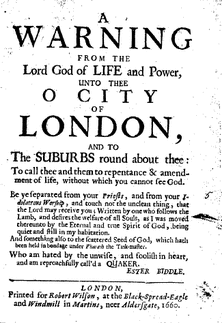 Esther Biddle, Quaker, 1660 This weekend I had the fun of seeing my first guest blog "Prophecy and Polemic— The Earliest Quaker Women" posted on the English Historical Fiction Authors website. There, I discuss why Quaker women were so political and how they differed in one particular way from most other women at the time--even members of other non-conformist sects (such as the Diggers, the Ranters, the Levelers etc). And oh! how they expressed themselves... Dressing in sack-cloth "Running naked as a sign" Refusing to bow to authority But that wasn't all... Quaker women were different because they wrote. And they wrote. And they wrote. And they wrote. In fact, as a group, Quaker women wrote 220 tracts before 1700, more than any other women. Petitions, broad-sides, chapbooks--all carrying admonitions to King, Parliament and clergy to recognize sinful acts, accounts of injustices and cruelties to their members, and pleas to release their religious brethren from prisons and authorize non-conformist worship in England, and the American colonies. I've always respected the bravery and creativity shown by the earliest Quakers, in their attempt to get their message heard. I've often thought how hard that must have been for them to write these open pieces. They were not just challenging Parliament, Magistrates, Churchmen and the King: they were challenging convention and the very heart of patriarchy, often risking public ridicule, shaming, abuses and imprisonment. Taking the mantles of Old Testament prophets, mid-seventeenth century Quaker women wrote openly about the social wrongs they perceived around them, especially those caused by the (imagined and real) abuses of men in power. In the soul-examining spirit of the time, Quaker women--like their male counterparts--also wrote publicly about their own struggles to find the "Inner Light" and to give up earthly fripperies. (Poor Susannah Whitrowe--she really wanted to cling to her ribbons, but knew she wasn't supposed to) They wrote about death and heartbreak, joy and promise. (This is not too suggest that they did not use their expressions of suffering to advance their cause--both politically and religiously--but there is an honesty to their expression that is admirable). At a time when women who wrote were disparaged as "petticoat authors," early Quaker women persevered to make their voices known. Just as they "ran naked as a sign" to convey their discontent to religious and secular authorities, they wrote nakedly too. They laid their emotions and concerns bare, for public consumption, expressing themselves in ways that were both daunting and inspiring. As I writer, I certainly struggle to lay my words bare on the page. Those little editorial voices are hard to muffle! I'm hoping, with time, to find my most authentic voice. How about you?
6 Comments
Matt
4/18/2012 08:29:47 am
Great post! These Quaker women seem fearless and devoted to their beliefs. In a sense, was it as if they were blogging? I'm having fun thinking what it would have been like if these Petticoat Authors had Twitter back then. What would their first tweet be?
Reply
4/19/2012 09:22:36 am
Matt, I think they would have taken to blogging and tweeting. I bet they'd have been called Tweeters! (since they were called Quakers for 'quaking in the presence of the Lord.') Hmmm, first tweet. Actually not that hard to figure out. Just look at the title of the piece above--I bet the title alone is 140 characters!
Reply
Vas
4/18/2012 11:56:53 pm
Great post and well written! Reminds me of Amelia Bloomer story and not following conventions but following her heart and beliefs.
Reply
4/19/2012 09:24:37 am
Vas--That's a great connection! Did you know Amelia Bloomer was a Quaker? or at least she was married to a Quaker. So hard to not follow convention, but I respect those who break away from what is expected and do something innovative!
Reply
Leave a Reply. |
Susanna CalkinsHistorian. Mystery writer. Researcher. Teacher. Occasional blogger. Categories
All
Archives
May 2023
|
 RSS Feed
RSS Feed